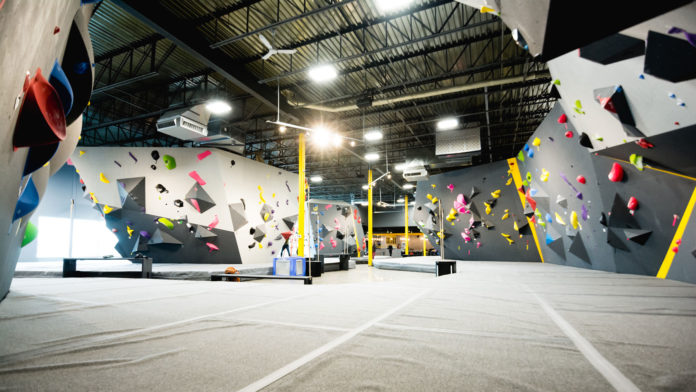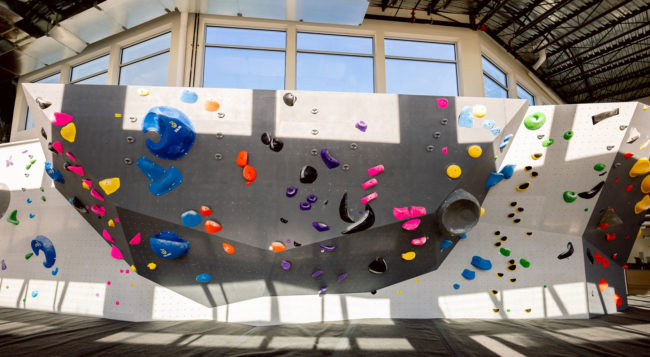
Rock climbing and sustainability go hand in hand. Since climbing’s earliest days, ecological and low-impact practices have been applied to our shared outdoor spaces, and later our indoor spaces with the rise of modern climbing gyms. But where does the sustainability movement in indoor climbing go from here, and how can a climbing brand be a catalyst for change?
DÉLIRE Climbing Walls, a climbing wall manufacturer and gym operator based out of Quebec, has been answering these questions for almost twenty years. Everything they do, from building sustainable climbing walls and repurposing materials into functional products, to offering volume refurbishing services and sourcing from local vendors, is built upon a foundational devotion to sustainability.
“The ecological impact of our activities has always been a concern of ours,” says Jeff Beaulieu, co-owner and conceptor of DÉLIRE. “Today, it is an essential issue.”
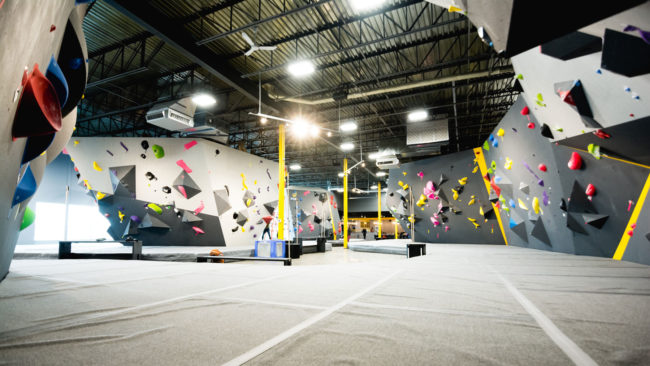
Sustainability – The Core of Everything
At DÉLIRE, sustainability isn’t just a word—it’s an ethos. “Sustainability is important for two principle reasons,” says Jeff. “First, it’s irresponsible in the modern socio-environmental context not to worry about our use and management of resources—material, energy, and human—and their global impact. The earth has its limits. Second, this approach is both profitable and competitive.” That ethos trickles down to every part of the business, from planning how, where, and what kind of materials to use, to offering upcycling and refurbishing services to customers in order to minimize waste and increase product life-spans.
Repurposing
When building a climbing wall, it is inevitable that there will be material waste. But by minimizing waste, and then repurposing the excess materials, the amount of unused and discarded materials decreases dramatically.
“Top-down planning of materials can minimize the amount of discarded waste,” says Jeff, who takes that planning down to specific, minute details. “To charge the full value of a 20-foot piece to the customer when I only need 18 feet, and then throw away the excess 2 feet which is unusable is not an effective/efficient way to do things. I must initially plan for a value-added use for that 2-foot piece.”
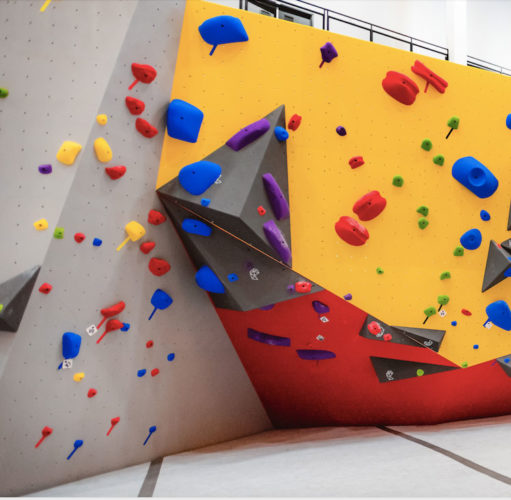
That value-added use can arrive in a variety of forms. Leftovers from wall production are repurposed to make volumes, steel brush holders, routesetting carts, and other gym necessaries. All of this is planned directly from the start. Beyond this, DÉLIRE created a program where all employees are encouraged to imagine new products that could be created from leftover materials. This program has resulted in furniture that lives in their gyms, like cubicles, benches and tables. Recently, DÉLIRE has started to offer these products-from-excess to their customers. What could have been tossed in the dumpster is now a useful, viable product—and one that carries with it a story of sustainability and ingenuity.
While detailed planning has a drastic effect in waste reduction, it can’t account for everything. But Jeff and DÉLIRE, once again, strive to be ahead of the game. “In the manufacturing of climbing walls, there are sometimes last-minute changes that need to be made, small defects or production accidents that need to be corrected, and unused backup panels that are left over.” Rather than discard that excess, DÉLIRE upcycles these materials into volumes. The quality and final product are the same as regular volumes, the only difference is that the shape of the volumes is adapted to the materials, creating tailor-made, unique shapes that you can’t find in a catalog.
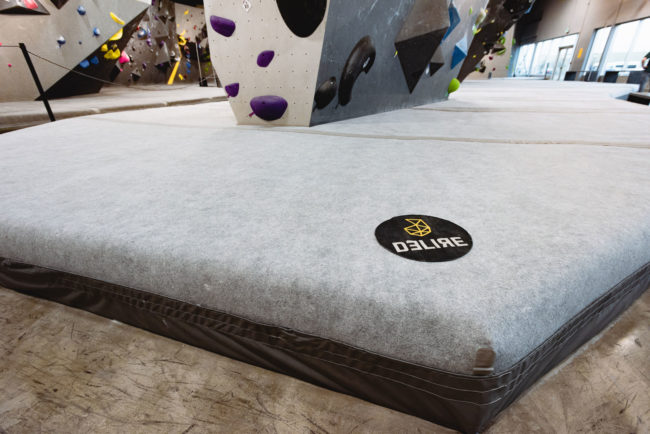
Sourcing Recycled and Sustainable Materials
To the team at DÉLIRE, simply repurposing excess materials is just a piece of the puzzle. When planning products and manufacturing, that lens of sustainability is focused on the materials themselves. “40% of the fibers in our composite mattress covers are from recycled sources, which are often from recycled plastic bottles,” says Jeff.
With their climbing walls, DÉLIRE has become a wall-manufacturing leader in the industry through a simple manufacturing decision: trading steel beams for engineered wood. It might look different at first, to see wood instead of steel behind the wall, but this practice not only offers long lasting, durable structures—it is carbon neutral. Engineered wood, which is not a recycled material in and of itself, allows for a more complete use of wood as a resource. “Pieces too small to make beams go into the manufacturing of engineered wood,” says Jeff. When we use this wood, we have a positive carbon balance.”
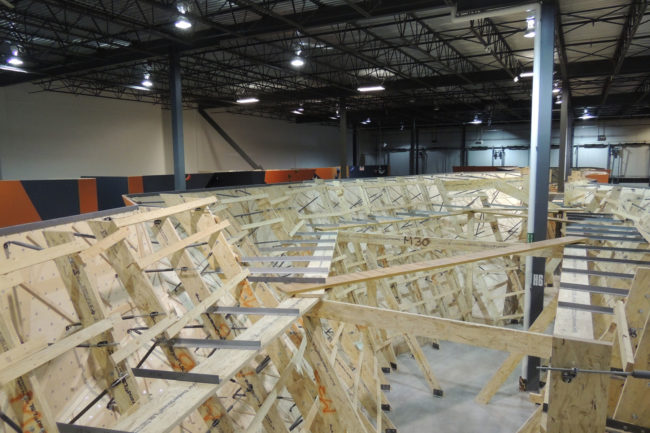
Refurbishing
In addition to applying sustainability practices to their home-grown products, DÉLIRE is poised to launch their newest sustainability-minded service—volume refurbishing, with the central goal of drastically increasing the lifespan of volumes at gyms. “In addition to being environmentally positive, it is very economical for customers because the estimated life is the same as new volumes, for 50% of the price,” says Jeff. This service will be offered regardless of the brand of the volume.
This sustainable approach is present even in the way they view the transportation aspects of the service. The goal is to implement a system like the milk delivery trucks of old. Every two months, DÉLIRE will travel around, delivering refurbished volumes to gyms while picking up other volumes that need some love. The end result is that the gyms will always have fresh, fully functional volumes. This service is still in the research and development stage, but they have just finished refining the refurbishing methods and plan to start promoting the service in their region, with goals to expand.
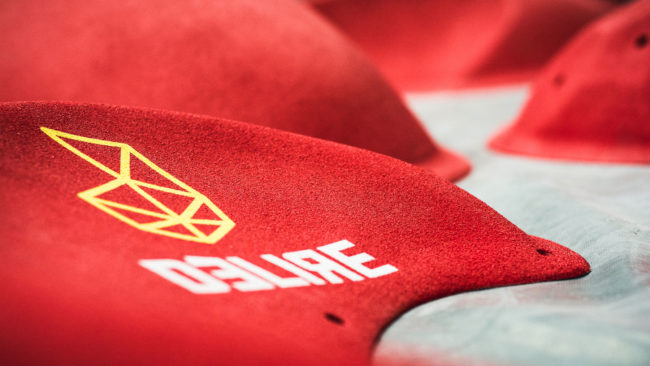
Relationships that are Trusted and Local
DÉLIRE prioritizes sustainability at every stage of the supply chain, and that’s why all their suppliers share two common traits—they are long lasting and local. In their nearly 20 years of operation, several of their suppliers have been involved since the beginning. “My relationship with [these partners] is as important as our relationship with clients,” says Jeff. “Trust that is built over time creates a beneficial reciprocal relationship.”
Because these businesses are local, what could be an impersonal business relationship ends up feeling more like a family. Shorter shipping times, face-to-face interactions, and direct access to technical information and support are all part of this ecosystem. The result is quality—in the relationship, in the manufactured product, in a lower environmental footprint, and ultimately in the customer experience. “I am willing to pay more for a local supplier because it comes with a better service in general, and that enriches my economic ecosystem. Choosing local suppliers also reduces our environmental impact.”
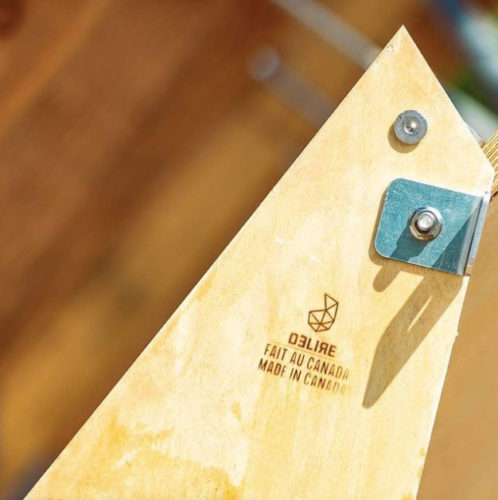
This devotion to local goes beyond DÉLIRE’s in-house production. Jeff has visions of extending that network by using ecological transport and utilizing local on-site teams to build climbing walls. “We have big dreams to become the biggest supplier of climbing surfaces in North America. Railway transport is ecological and well organized in America. Wall installation can be done by local teams, supervised remotely as needed. A larger portion of the money from gym projects will remain in the gym community. Everyone wins.”
As the climbing industry continues to expand and evolve, Jeff expects sustainability will become a more central focal point in industry discussions. DÉLIRE works hard to be ahead of the curve, paving the way to sustainable practices that are practical, productive, and cost-beneficial. “In the end,” says Beaulieu, “What is most valuable to me is the pride in what we build and the positive impact it has in our society.”

DÉLIRE Climbing Walls designs and builds sustainable climbing walls and gyms of the highest quality and integrity and is the manufacturing arm of DÉLIRE Escalade, which operates multiple indoor climbing gyms and an outdoor bouldering gym in Quebec, Canada.




